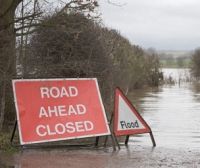

Launching a major, long-term strategy to tackle flooding and coastal change, Environment Agency Chair, Emma Howard Boyd has said "we cannot win a war against water" by building higher flood defences, and called for a new approach to ensure communities are resilient to the threat of flooding posed by climate change.
Opening an 8-week consultation on the new strategy, Boyd said that the Environment Agency is preparing for a potential 4°C rise in global temperature and urgent action is needed to tackle more frequent, intense flooding and sea level rise.
Among the recommendations in the strategy, the Environment Agency has committed to working with partners to develop consistent standards for flood and coastal resilience across the country. To achieve these standards, communities should have access to a range of tools which give them control of how they prepare for and respond to flooding and coastal change, based on specific challenges that area may face.
These could include traditional defences, temporary barriers, natural flood management, sustainable drainage systems, effective flood warnings and emergency response, alongside designing and adapting existing properties and new developments so they can recover quickly from a flood.
Boyd said "the coastline has never stayed in the same place and they have always been floods, but climate change is increasing and accelerating these threats".
"We can't win a war against water by building away climate change with infinitely high flood defences. We need to develop consistent standards for flood and coastal resilience in England that help communities better understand their risk and give them more control about how to adapt and respond".
Currently two thirds of properties in England are served by infrastructure in areas at risk of flooding and for every person who suffers flooding, around 16 more are affected by loss of services such as power, transport and telecommunications.
The Strategy calls for all infrastructure to be flood resilient by 2050 and the Environment Agency has committed to working with risk management authorities and infrastructure providers to achieve this. In addition an average of £1 billion will need to be invested each year in traditional flood and coastal defences and natural flood management. The National Audit Office has previously reported that for every £1 spent on protecting communities, around £9 in property damages and wider impacts are avoided.
As well as taking precautions to prepare for flooding and prevent damage, the strategy calls for more to be done to encourage property owners to "build back better" after a flood. This could involve home improvements to make them more resilient, such as raised electrics, hard flooring and flood doors. The Environment Agency will work with the Government, insurers and financial institutions to review how to bring about this change by 2025.
Over 5 million people in England are at risk from flooding and coastal erosion. Yet only a third of people who live in areas at risk of flooding believe their property is at risk. The Strategy pledges to build a nation of 'climate champions' working with the school curriculum to educate young people about the risk, and continuing to develop accessible digital tools to communicate flooding.
The Strategy also recommends:
The Flood and Coastal Management Strategy consultation is due to run from 9 May 2019 until 4 July 2019. Once closed, the Environment Agency will review the responses and publish a final document which will then be laid before Parliament in Winter 2019.
This Strategy forms part of the Government's commitments set out in the 25 Year Environment Plan to improve the environment within a generation, leaving it in a better state than we found it.
Lord Deben, Chairman of the Committee on Climate Change said "everyone can see climate change accelerating. The UK urgently needs to stay ahead of worsening impacts by adapting. The Environment Agency is doing just that by setting out their flood strategy but we won't be able to keep up with the pace of change if we don't reduce emissions to zero".
For more information on this subject, see: